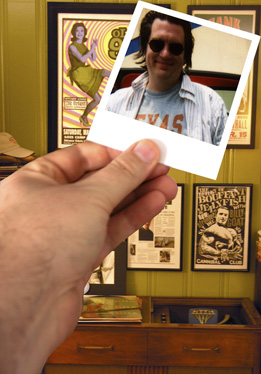
Forget the mid-term elections and Iraq, global warming and all the other burning issues of the day, Slate has gotten down to dealing with one of the largely ignored topics that we must resolve RIGHT FREAKING NOW: who was the greatest rock band of the 1980s, R.E.M. or U2?
The article reminded me of something from those days. "Either you loved U2, or you liked them fine. Either you loved R.E.M., or you hated them." I liked U2 just fine, but I LOVED R.E.M. I remember buying Fables of the Reconstruction when it first came out in the summer of 1985 and listening to it over and over. Those were the days when finding anything "alternative" was like going on a secret mission. You had to drive to some record store in Dallas like VVV or Metamorphasis or Bill's to find the stuff half the time. The only way you could hear it on the radio was to tune in to KNON or George Gimarc's Rock and Roll Alternative.
And, of course, if you were listening to R.E.M and not, say, Night Ranger or .38 Special, then you were pretty much considered a freak. But when you would tune in to Shaggy on KNON and hear "Driver 8" or "Green Grow the Rushes", I always felt a little less freakish. The music was somehow healing.
To quote the article:
For all of their ambition, in the 1980s, R.E.M.'s music was willfully obscure. Much has been made of Michael Stipe's mumbly lyrics, but it wasn't that you couldn't make out the words of early R.E.M. songs—you just didn't know what the hell they meant. Neither did the band. "I still have no idea what that song is about," Stipe writes about "Pilgrimage," and bassist Mike Mills says the same about "Gardening at Night" (while drummer Bill Berry claims it's based on a euphemism for peeing along the side of the road during an all-night drive). The lyrics could mean anything, and therefore they meant everything, weighted as they were with mystery, resonance, and passion. "It's not necessarily what we meant," writes Mills, "but whatever you think." A friend once gave his sister, for her birthday in 1988, a complete collection of R.E.M. lyrics, painstakingly hand-transcribed from repeated listens to the songs. Were they right? It hardly mattered.
Even R.E.M.'s "political" songs of the era, like "Fall on Me" or "Exhuming McCarthy," are tricky to parse. "Fall on Me" could maybe be about acid rain, or maybe air pollution in general, or maybe, uh, missile defense? Whereas U2's political songs of the 1980s are a little easier to work out: "Pride (In the Name of Love)" is about Martin Luther King Jr., for example, and "Sunday, Bloody Sunday" is about Bloody Sunday. Stirring as those songs are, there's very little a listener can bring to them; they are Bono's take, not yours, unlike "Fall on Me," which, for me, in 1987, was a deeply personal song about the crushing whatever of existence.
To me, the music I listened to then made the crushing whatever of existence a little easier to bear. And know some of that was the oppressed, adolescent worldview that has always been and always will be. But I still listen to R.E.M. today. Fables is still on my turntable at home right now. And I do take issue with the article in one regard, I though Around the Sun was a great album. Michael Stipe is a little less obscure than he used to be, but the lyrics still seem as malleable as ever.
So put me in the R.E.M. camp. No offense, Bono. Love the debt forgiveness and red iPods. I guess I just lean more toward elegies than anthems.

No comments:
Post a Comment